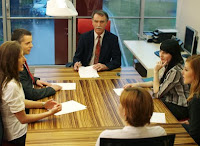Nonprofit agencies pay for professional services all the time. I’ve worked with animal welfare agencies that hire veterinarians and Internet technicians and I’ve worked with disability organizations that hire instructors and therapists. Executive Directors (ED) will budget for those services and of course they only employ professionals to do the work. They would never dream of allowing a volunteer to fill in for a veterinarian if they weren’t a licensed vet.
Sometimes when it comes to paying for a grant writer ED’s cut corners, and often anyone with time and a computer will do. Is this something you do as an ED? Perhaps that’s because you have not been successful at writing grants in the past, so you could feel that securing grants is a matter of throwing proposals against the wall until something sticks.
I can assure you that a professional grant writer is worth the money. A well-crafted narrative can make all the difference in a funding competition. In the current economic times, there are a lot more organizations submitting proposals than ever. In order to secure a share of the money these days, you want your proposal to stand out because it’s outstanding, not because it looks like a amateur wrote it. When I’ve read grants in the past as part of scoring teams, a poorly written grant stands out like a sore thumb.
Grant research and grant writing are very time-consuming activities. I know, I pretty much do them all day, every day. While that’s my job focus, an ED has a lot of other things to do, not the least of which is the care and feeding of their Board and donors. I am amazed that ED’s find any time to write grants at all. I don’t know, but I suspect most of that writing happens in the wee hours of the morning propelled by Starbucks.
I want to suggest to Executive Directors that your time might be better spent on planning fund raising for other legs of the funding stool, events, and donor cultivation. You might be a good grant writer, but those of us who work on grants full time still have an advantage. I’d suggest to you also that hiring a grant writer is not shirking your duty, it is a wise use of time and resources.
A good grant writer can increase your bottom line and relieve you of the task so you can do more of what you’re best at, connecting with people! Grant writing is a professional service and paying for professional services in support of the mission can be a wise investment.
——————————
This post was written by non-profit consultant and expert grant writer, Derek Link.
——————————
Related posts and aticles:
Working with a Grant Writer – You Get What You Pay For
Good Grant Writers are like Wedding Planners
Do I Really Need a Grant Writer?





